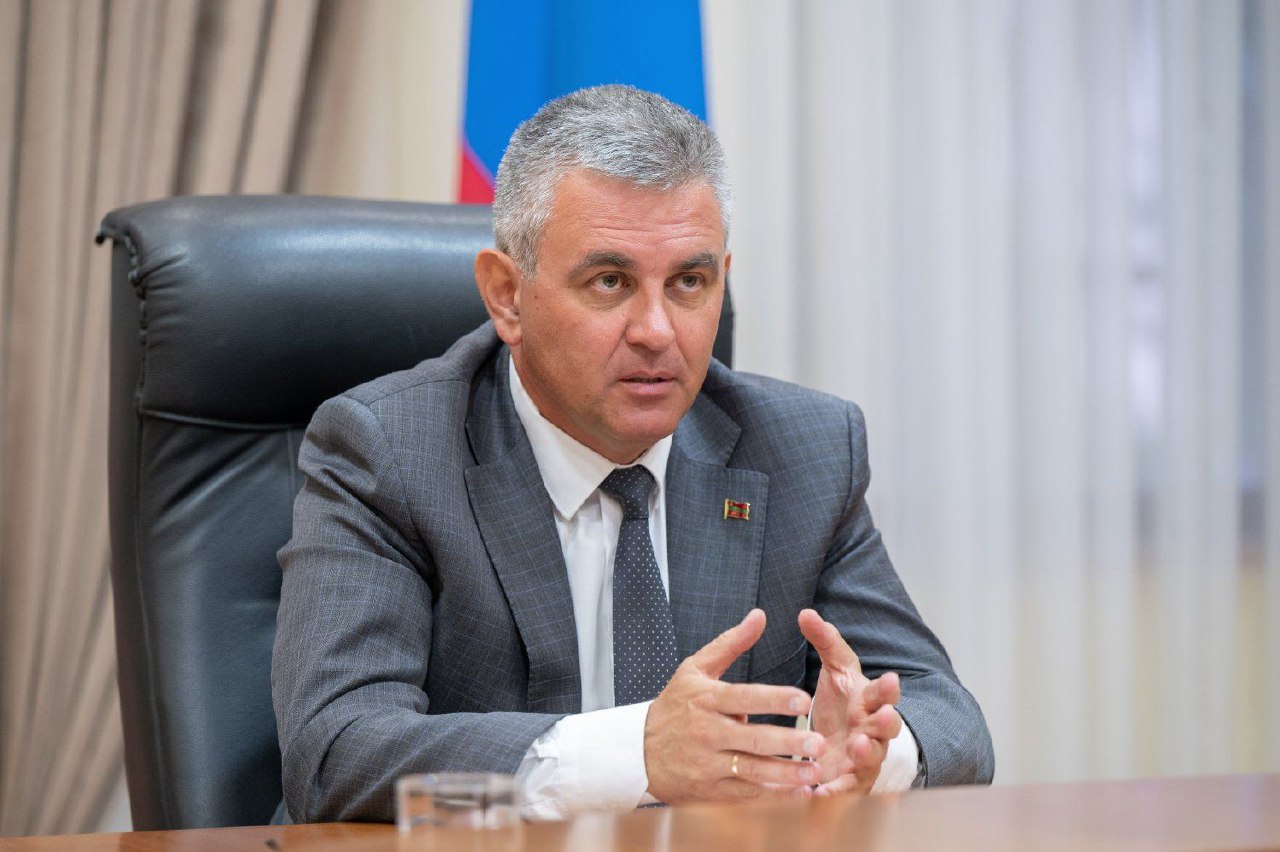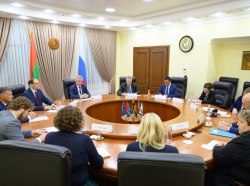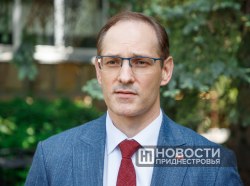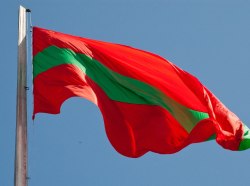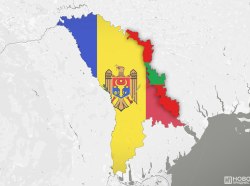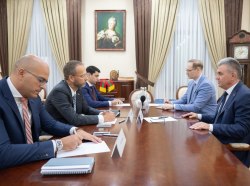The agreement on the principles of the peaceful settlement of the armed conflict in Pridnestrovie was officially signed exactly 30 years ago, on July 21, 1992. The PMR President Vadim Krasnoselsky answered questions of a journalist from "The Parliamentskaya Gazeta" (Parliamentary Newspaper) publication of the Federal Assembly of the Russian Federation on the eve of the anniversary of this significant event for the republic.
- Vadim Nikolaevich, the effectiveness of the Russian peacekeeping mission in Pridnestrovie has been disputed in recent years, there are proposals to change the format. What is your point of view?
- The signatories then were the Russian and Moldovan presidents Yeltsin and Snegur. There is no signature of a representative of the Pridnestrovian side, but Igor Smirnov was present at the official conclusion of the agreement, and at the preliminary stage of developing the text of the Agreement, Pridnestrovie approved each item of the document. It contains only eight articles. The rules are clearly fixed. The essence is a ceasefire and any kind of armed actions, the disengagement of paramilitary formations within a week, the creation of a Security Zone, the establishment and determination of the principles for the activities of the Joint Control Commission of representatives of the three parties. The units of the Russian army (then the 14th) stationed in the conflict zone were prescribed strict neutrality. The prevention of any sanctions and blockades, including obstruction of the movement of people and goods, was fixed for Moldova and Pridnestrovie. No one has canceled the provisions of this Agreement to this day, no one has withdrawn from the agreement. At the same time, such an opportunity is provided for the signatories – Russia and Moldova. The final article says that the Agreement is terminated by the consent of the contracting parties or in the event of the withdrawal of one of them. What do we see today? Moldova did not withdraw from the Agreement, and the blockade against Pridnestrovie prohibited by the provisions of this document has become a common practice. Limiting the movement of goods is also our reality. There are more than enough examples even in this difficult post-pandemic year against the background of the most difficult geopolitical situation. The work of the JCC is constantly disrupted by the Moldovan side. The topic of peacemaking is being discussed as much as they can. 30 years of peace. No one dead, what other confirmation of the success and effectiveness of this operation is needed? How and why is it necessary to reinforce the expediency of the presence of Russian peacekeepers on the banks of the Dniester? To change the format? What for? Maybe someone does not know, tries to keep silent or forget, but there have already been international observers in the history of Pridnestrovie. A specially created international commission was in Bendery in June 1992, when Moldova prepared its Trojan horse for Pridnestrovie, adopting a false resolution on a peaceful settlement, and a couple of days later attacking a peaceful, disarmed city. What did its representatives do? They watched how the norms of the agreement, human and God's laws were violated. They just ran away. Pridnestrovians had to save their lives. And what is the result? Is there one line of truth in the reports? Not a word! Here they are, international observers. Are they being offered to us today to ensure peace? No. No matter what anyone says, the contribution of the Russian peacekeepers cannot be belittled. On July 29, 1992, Pskov and Tula paratroopers landed in Tiraspol, on the same day the Russian peacekeepers were in Dubossary, the next day in Bendery. Peace came with them, which they have been guarding for 30 years. To refuse their presence is as stupid and dangerous as cutting the branch on which you are sitting.
- July 28, 1992 – 30 years of the peacekeeping operation on the Dniester. Are there any festive events being prepared for such a significant occasion? How do you support veterans of the conflict?
- Naturally, we honor peacekeepers every year. Words of gratitude are addressed to them not only on July 29th. Any mention of the events of 1992 is linked to the peacekeepers, their contribution to peace and security. The situation is developing in such a way that the Pridnestrovians in recent years had to support Russian peacekeepers, defend them, tell the international community about the role of Russian peacekeeping. Everything is mutual. We remember the helping hand extended to us. Pridnestrovians generally tend to preserve history in its true form without embellishment, without convenient silences for someone. We appreciate and protect what we have. The Russian peacekeeping mission is part of our history. This is an important component, without which the story as such could be completely different.
- Gross violations of the Geneva Conventions were committed during the armed conflict in Pridnestrovie in March-July 1992. More than 800 Pridnestrovians died, 271 of which were civilians as a result of the military aggression of Moldova. Has anyone been prosecuted in Moldova for war crimes against the Pridnestrovian people?
- So far, we have to state that no one has been held responsible for the war crimes committed against the people of Pridnestrovie. Moreover, Moldovan politicians do not recognize these crimes. Killers of Pridnestrovian civilians are honored In Moldova, state awards are presented to them, on June 19, on the Day of the Bendery tragedy, congratulations are given, the year of the 30th anniversary of the war unleashed against Pridnestrovie is dedicated to the combatants. It is regrettable that there is no condemnation from European countries either. The European Parliament recognized the territory of Pridnestrovie as occupied by Russia. The Moldovan delegation that participated in this vote unanimously supported this decision. Moldova is aggressor that came to the peaceful Pridnestrovian land, destroyed the Pridnestrovian people, recognizes Russia as the aggressor, which stopped the bloodshed, ensuring peace for the Pridnestrovians. This might seem ridiculous and absurd if it were not for the sad reality. So for now, no recognition, no repentance, no responsibility.
- Terrorist attacks and provocations have taken place in Pridnestrovie in recent months. What are the attempts to destabilize the situation in the republic aimed at and who is behind them in your opinion?
We do not hide information. There were terrorist attacks and provocations. It was provocations to a greater extent of course. It wasn't so much physical danger as an attempt to sow panic, made noise. They blew it up there, set it on fire. All this was warmed up by information stuffing. Of course, people were nervous. Someone decided to leave. Nobody has the right to judge them. Everyone makes a decision. We were obliged to introduce a special regime in the country. This is a matter of ensuring the security of the population of the country. Law enforcement agencies were transferred to an enhanced mode of service. Set up roadblocks at the entrances to the city. Residents reacted with due understanding to these measures. Messages in social networks and some media that there are allegedly queues of people wishing to leave the republic at the border are, again, a provocative lie. Queues appeared firstly because citizens were returning home after the May holidays, and secondly, because the inspection of vehicles took time. The strengthening of the regime did not caused any changes in the army units.
- You have repeatedly refuted the repeated reports in the information space with reference to the General Staff of the Armed Forces of Ukraine about the alleged transfer of the Armed Forces of the Pridnestrovian Moldavian Republic to full combat readiness. Who benefits from such misinformation?
- We did not announce a general mobilization. People, especially when panicked, tend to believe what they fear. The provocateurs had a specific goal – to sow panic. They did it. I am grateful to the people of the republic for the fact that they withstood this information onslaught. I will not tire of repeating that I am as honest as possible with the residents of the republic: when there is a reason for concern, I openly talk about it, when there is none, I ask you not to listen to idle speculation and focus on official reports. This is how it is done in our country: everything is transparent and democratic, all important decisions are made by the people.
Investigations of terrorist attacks are underway on separate facts found performers and customers. Information is open. We publish all information promptly. The trace is clearly Ukrainian in one case, in the other - Moldovan.
- How many refugees from Ukraine are now in Pridnestrovie and what kind of assistance is provided to them?
– More than 30000 citizens of Ukraine who were forced to leave their homes have found temporary shelter in Pridnestrovie since the end of February. A lot of people stayed with relatives, acquaintances or simply caring people who responded to someone else's misfortune, provided refugees with housing and food. Volunteers help. Temporary stays are open. They were opened in different cities. The flow of refugees was large at first. We have deployed seven points. We were ready to deploy another fifteen points in the event of an increase in the number of refugees. Hundreds of Ukrainian children went to our schools and kindergartens. Moreover, taking into consideration the multinational specifics of our state, the choice was given which institution to go to – Russian, Ukrainian or Moldovan. The children are given the opportunity to attend institutions of additional education and sports sections. Everything is free of course. Adults are allowed to work under a simplified scheme. We are doing our best to help these people. Ukrainian families helped Pridnestrovians in 1992. Now we support them. There are fewer refugees now. There are about 200 people in temporary residences.
- The European Union and the United States are working very rudely with Moldova, trying to make a second Ukraine out of the republic. What are the chances for the emergence of another hot spot in the post-Soviet space?
- If some countries like to participate in political games – this is their right. It is important to understand what role they are destined for. Someone might be interested in being a pawn in someone else's big game, but we will not allow Pridnestrovie to be drawn into these games. The fact that Moldova has chosen the European vector for itself is an accomplished fact. It didn't happen today or yesterday. The neighboring state systematically followed this path and continues to move towards the intended goal as best it can. Why should we somehow resist someone else's choice? No. We respect him. We demand respect for ours. Pridnestrovie clearly follows an easterly direction. European values and priorities are alien to us. We have chosen the Eurasian vector as our vector and we are confidently moving along this path. Our paths with Moldova diverged a long time ago. We are two separate states, no matter what they try to talk about some kind of integrity. Moldova destroyed it three decades ago, leaving the MSSR, unleashing a war. We are ready for dialogue, peaceful equal dialogue. We will do everything to prevent the escalation of the conflict. War is our past. We are ready and able to defend our country, but we stand exclusively for the peaceful solution of all issues. The 5+2 format has worked successfully for many years. It stumbled. These are the circumstances. But it is not a panacea, not the only tool of communication. There are other forms. We must continue negotiations. People don't care who and with whom discusses political issues. People need practical solutions that will make their lives safe and comfortable. We point-to-point solve current problems. There is no consistency unfortunately. Moldova in a global sense remains true to its principle of non-fulfillment of the agreements reached. This practice goes back to the very decisions with which we started this conversation.
- How does the economy of Pridnestrovie function under these conditions, what are the main problems the republic is currently experiencing?
–It is difficult for Pridnestrovie of course. Economic entities are in an extremely difficult position. Exports have seriously dipped. Foreign markets have become inaccessible or unprofitable due to the complicated logistics of supplies. Ukraine is closed. Moldova puts more and more obstacles. Nevertheless, Pridnestrovians do not give up. We survived so many blockades, the war – and survived. Let's get it right now. Unfortunately, some development programs have to be sacrificed, some projects have to be postponed. Life in the republic does not stop. We strive to minimize dependence on external factors, aim to ensure self-sufficiency, develop domestic production and tourism. Pridnestrovie is a living, formed organism. We have our own state authorities, law enforcement and law enforcement agencies, healthcare, and education. The agricultural sector is gaining momentum. The industry is working. Entrepreneurship is developing. There are unique productions in the republic. New agro-industrial facilities are being created, the technology of which is seriously ahead of analogues available in neighboring states. Despite all the difficulties, our cities and villages are getting prettier. The social infrastructure is being updated. Housing is being built. The state regularly fulfills all social obligations. We create job places. We train new personnel. We are independent. This must be accepted as an accomplished fact.

